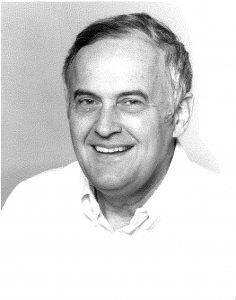
John Bernhardt, who did so much for students and the University during his 35 years as a lecturer in biology, has also been a model of selfless community service that has continued since his retirement in 2001. In recognition of all of that, UNC Asheville’s Retired Faculty and Administrators Association (RFAA) has named Bernhardt as the first-ever recipient of the Award for Lifetime Service and Contribution to the University of North Carolina Asheville.
As a volunteer, Bernhardt monitored nursing home facilities for more than three decades as part of the Buncombe County Ombudsman program, and for five years he worked with the late Dr. Charles Blair (founder of ABIPA) to promote health in the African American community. Additionally, he has given generously and continuously of his time, treasure, and wisdom to a variety of community organizations, including MemoryCare, the YMI Cultural Center, and Wild for Life. More than a board member and contributor, he has also been a volunteer and mentor, without seeking acclaim or public recognition. His way of giving as retiree comes naturally because he cultivated the habit during his years on faculty, serving students in capacities far beyond classroom lecturing.
Having studied at Princeton and Harvard Medical School in addition to gaining degrees from Davidson College and Duke University, Bernhardt served throughout his tenure at UNC Asheville as the advisor for students hoping to enter medical school and other health professions.
Dr. Bruce Councell, a UNC Asheville graduate who is one of the Western North Carolina’s leading gynecologic surgeons, says, “John Bernhardt was an inspiration for my choosing medicine as a career. He had that eternal smile and deferential way with his students that made us feel more like his peers than just undergraduates. His passion and unique curiosity regarding the teaching of biology always excited and energized me in the pursuit of learning. He was always willing to stay behind with his students one on one to patiently and kindly answer questions and to debate respectfully some of the controversial issues of biological science.”
Why did Bernhardt take that approach? “I really had a lot of fun,” he says. “It was always a joy to me to work with the students – they were earnest and curious and I loved helping them get more excited about learning and investigating things.”
Bernhardt was a pioneer in introducing undergraduate research, and he helped students apply for and secure one of the first National Science Foundation grants made to undergraduates, which was used to study the ecological effects in Lake Julian of the power plant’s thermal input. Two years later, his students got a grant to do a similar study of the ecological recovery of the Pigeon River, and eight of the 10 students went on to graduate school.
He also served as advisor to UNC Asheville’s student newspaper, was faculty advisor to the campus Baptist Student Union, and at a time of concern about drug use by young people, he worked with local churches to organize a coffee house with live music and adult counselors present. He has had long-term mentoring and helping relationships with some of his students, financially putting one through graduate school. He is now the main caregiver for a student-advisee of 45 years ago.
This kind of “whole person” approach made an impact on UNC Asheville’s Environmental Studies Lab Manager and alum Susie Wright, who took an intro biology course co-taught by Bernhardt and Harry Johnston, circa 1981. “What I remember learning from Harry Johnston was that fruit flies have an amazing amount of DNA info in a tiny little body,” Wright recalls. “What I learned from John Bernhardt is that there can be a tremendous amount of knowledge, compassion, and personality in one human. I will never forget him showing slides of a trip to the Galapagos and how fascinated I was. I never dreamed he would be a lifelong friend.”
Bernhardt not only helped inspire Wright’s lifelong interest in wildlife and the environment, but he has worked closely with her, devoting a great deal of time, money and effort to help Wright and project partner (and UNC Asheville alum) Mary Beth Bryman launch, grow and maintain their non-profit organization, the Wild for Life Center for Rehabilitation of Wildlife. When asked about his contributions to community organizations, Bernhardt says, “They all do such good and important work,” laughing off any recognition for himself. Doing good and important work has been the life work of John Bernhardt, and for this, he has been given the first-ever lifetime service award issued by the Retired Faculty and Administrators Association at UNC Asheville (RFAA).
Share
Permalink: